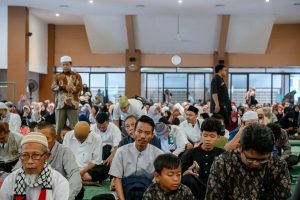By Imam Dr. Wael Shehab
Hijrah, the turning point in Islamic History, has significant lessons that Muslims should understand. Due to its pivotal role in establishing the first Muslim state and spreading Islamic values—such as justice, equality, freedom, and peace for all–`Umar ibn al-Kattab (may Allah be pleased with him) started the Islamic calendar with its date, i.e., the Hijrah year.
Muslims in today’s world are in bad need of studying the Prophet’s Hijrah in order to cope with and overcome life’s difficulties and hardships. One of the main lessons of Hijrah is that after difficulty comes ease and after storm comes sunshine. The Qur’an says, {Indeed, With hardship comes ease; indeed, with hardship comes ease}. (Ash-Sharh 94: 5-6)
Grieve Not, God Is Always There
Also Read: Imaam Yakhsyallah: Nurture Love for the Prophet, One Will Be with Whom One Loves
In the most difficult moments in Hijrah, Prophet Muhammad (peace and blessings of Allah be upon him) and his Companions never lost hope in gaining Allah’s support and help. For instance, when the disbelievers of Makkah, who went out in search of the Prophet and his friend Abu Bakr (may Allah be pleased with him) in their way to Madinah, were about to hold them in the cave of Thawr, the Prophet said to his friend, as the Qur’an narrates, {Grieve not. Surely! Allah is with us.} (At-Tawbah 9: 40)
Allah Almighty protected His Prophet (peace and blessings of Allah be upon him) and the Companions against the wicked plans of the disbelievers of Makkah. The Qur’an narrates those hard moments, saying,
{If you help him not, still Allah helped him when those who disbelieve drove him forth, the second of two; when they two were in the cave, when he said unto his comrade: Grieve not. Surely! Allah is with us. Then Allah caused His peace of reassurance to descend upon him and supported him with hosts ye cannot see, and made the word of those who disbelieved the nethermost, while Allah’s word it was that became the uppermost. Allah is Mighty, Wise.} (At-Tawbah 9: 40)
After Hijrah, Muslims, who had been severely oppressed and persecuted by the disbelievers of Makkah, became able to freely live Islam in Madinah. Therefore, Muslims shouldered the responsibility of spreading values of justice, freedom, equally, and human dignity across the world.
Also Read: Thanksgiving: An Islamic Perspective
We really need to feel the presence of God in all times. In difficult times, God will surely make a way-out for you. In good times, don’t forget God who blesses you with His favours and bounties. A Muslim should never despair or feel helpless. As God is always there, everything will be under His control and He is the Most-Merciful, the Most-Kind.
The great companion ibn `Abbas (may Allah be pleased with them both) reported that:
One day I was riding behind the Prophet (peace and blessings of Allah be upon him) and he said to me:
Young man, I shall teach you some words [of advice]: Be mindful of Allah, and Allah will protect you. Be mindful of Allah, and you will find Him in front of you.
Also Read: Achieving the Position of Fasting Expert with Kindness of Morality
If you ask, ask of Allah; if you seek help, seek help of Allah.
Know that if the Nation were to gather together to benefit you with anything, it would benefit you only with something that Allah had already prescribed for you, and that if they gather together to harm you with anything, they would harm you only with something Allah had already prescribed for you. The pens have been lifted and the pages have dried. (At-Tirmidhi)
Real Trust on God
Real trust on God means that one should spare no efforts to achieve his or her goals. However, one should be satisfied with Allah’s decree, knowing that whatever happens is good for him or her. When a Muslim does his or her best to do goodness, he or she should put his trust on God to fulfill his or her goals.
Also Read: The Power of Charity in Ramadan
In the Hijrah, Prophet Muhammad (peace and blessings be upon him) spared no efforts to reach Madinah, his destination, safely. He took all measures that could secure his and his friend’s lives in order to deliver the message of Islam and found the first Muslim state. When people of Makkah reached him while he was in the cave of Tawr, he had unswerving faith that God would never leave him alone.
Today, Muslims should maintain real trust on Allah by means of doing their utmost efforts to serve their community and relying on God to grant them success in this world and the world to come. We really need to faithfully rely on God. In his well-known book, Al-Hikam (Words of Wisdom), sheikh Ahmad Ibn `Ataa’illah As-Sakandari says:
“Save yourself from worrying. Somebody else (God) already took care of your affairs (yudabir) for you.”
Commenting on the above pearl of wisdom, Dr. Jasser `Auda says:
Also Read: Ramadan Brings the Change
Tadbir in Arabic means considering the results and outcomes of a certain action. Therefore, tadbir is closely connected with outcomes. In their turn, the outcomes are connected with the concept of relying on Allah. Allah says:
{… so that they answered, “God is enough for us; and how excellent a guardian is He!”} (Aal `Imran 3:173)
{Then, when you have decided upon a course of action, place your trust in God: for, verily, God loves those who place their trust in Him.} (Aal `Imran 3:159)
{In God, then, let the believers place their trust!} (Aal `Imran 3:160)
Also Read: Ramadan, the Month of Education
To conclude, Hijrah event implants on our hearts the spirit of hope, peace of mind, sakinah (tranquility), and true trust on God. A Muslim, who really relies on God, should never despair or feel helpless. God, the Most Merciful and Most Kind, is always there and takes care of our affairs. Praise be to God, to Him we belong and to Him we will return. (P007/R03)
Mi’raj Islamic News Agency (MINA)
Taken from OnIslam
Also Read: Come on Do I’tikaf




































 Mina Indonesia
Mina Indonesia Mina Arabic
Mina Arabic